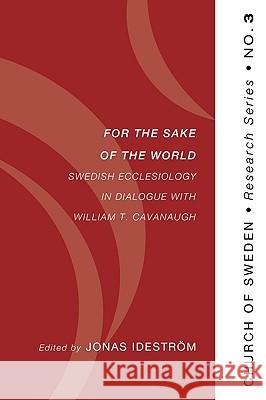For the Sake of the World » książka
For the Sake of the World
ISBN-13: 9781608991082 / Angielski / Miękka / 2010 / 145 str.
For the Sake of the World
ISBN-13: 9781608991082 / Angielski / Miękka / 2010 / 145 str.
(netto: 98,11 VAT: 5%)
Najniższa cena z 30 dni: 101,89
ok. 16-18 dni roboczych.
Darmowa dostawa!
Description: The church exists for the sake of the world. The crucial ecclesiological question that this book raises is How? How does the church exist for sake of the world? One can describe the theological reflections in this book as a form of concrete ecclesiology--critical theological reflections on the way the church is manifested in social and historical contexts as a social body. By using concepts like body, queer, human rights, practices, social process, and space, the manifestations of the concrete church are critically and constructively analyzed from a theological perspective. The arguments in the articles were presented at a symposium in Sweden. The purpose of the symposium was not to reach consensus but to stimulate creative and critical discussions concerning theology, politics and the identity of the church with a focus on Church of Sweden. American theologian William T. Cavanaugh, who has made himself known as a distinct voice in the discussion of ecclesiology and politics, participated and contributes with critical and constructive reflections on the relationship between church and state. This book offers important arguments and reflections into the discussion on ecclesiology and politics that has relevance far beyond the Swedish context. Contributors: JONAS IDESTROM, WILLIAM T. CAVANAUGH, ARNE RASMUSSON, HENRIK WIDMARK, GORAN GUNNER, NINNA EDGARDH, ANTJE JACKELEN, and OLA SIGURDSON. Endorsements: ""A book like this--exploring areas of fruitful interaction between a radical discipleship ecclesiology and a onetime state church in western Europe--would have been inconceivable a generation ago. It is a testimony to the depth and power of William Cavanaugh's scholarship that his work now engages scholars and church leaders worldwide. This is a useful book for persons interested in the vision of the church that Cavanaugh puts before us, as well as for students of contemporary European religion, politics, and culture."" --Michael L. Budde DePaul University, _Chicago, Illinois About the Contributor(s): Jonas Idestrom is a doctor in ecclesiology and a minister in Church of Sweden."
Description:The church exists for the sake of the world. The crucial ecclesiological question that this book raises is How? How does the church exist for sake of the world? One can describe the theological reflections in this book as a form of concrete ecclesiology--critical theological reflections on the way the church is manifested in social and historical contexts as a social body. By using concepts like body, queer, human rights, practices, social process, and space, the manifestations of the concrete church are critically and constructively analyzed from a theological perspective. The arguments in the articles were presented at a symposium in Sweden. The purpose of the symposium was not to reach consensus but to stimulate creative and critical discussions concerning theology, politics and the identity of the church with a focus on Church of Sweden. American theologian William T. Cavanaugh, who has made himself known as a distinct voice in the discussion of ecclesiology and politics, participated and contributes with critical and constructive reflections on the relationship between church and state. This book offers important arguments and reflections into the discussion on ecclesiology and politics that has relevance far beyond the Swedish context.Contributors: JONAS IDESTRÖM, WILLIAM T. CAVANAUGH, ARNE RASMUSSON, HENRIK WIDMARK, GÖRAN GUNNER, NINNA EDGARDH, ANTJE JACKELÉN, and OLA SIGURDSON. Endorsements:""A book like this--exploring areas of fruitful interaction between a radical discipleship ecclesiology and a onetime state church in western Europe--would have been inconceivable a generation ago. It is a testimony to the depth and power of William Cavanaughs scholarship that his work now engages scholars and church leaders worldwide. This is a useful book for persons interested in the vision of the church that Cavanaugh puts before us, as well as for students of contemporary European religion, politics, and culture.""--Michael L. BuddeDePaul University,_Chicago, IllinoisAbout the Contributor(s):Jonas Ideström is a doctor in ecclesiology and a minister in Church of Sweden.











